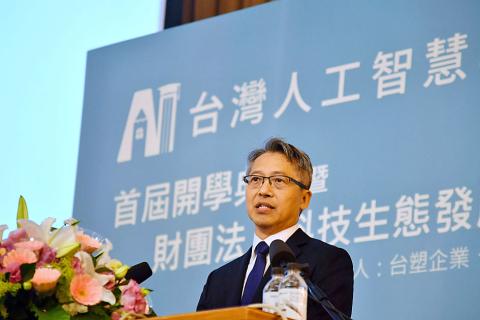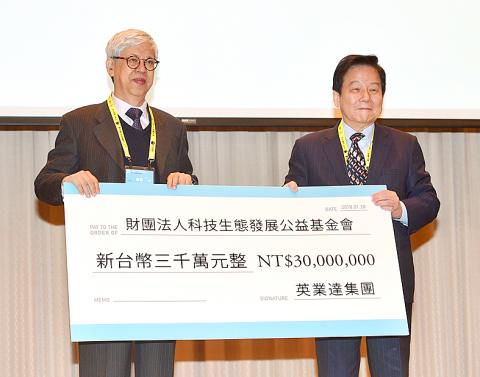The nation’s first artificial intelligence (AI) academy was yesterday inaugurated at Academia Sinica in Taipei, drawing 530 students and donations totaling NT$150 million (US$5.15 million) from five businesses for its first semester.
The academy incorporates two 12-week courses: a skills training program and a weekend program for business managers, academy chief executive officer Chen Sheng-wei (陳昇瑋) said at the ceremony.
After reviewing 900 applications, the academy admitted 210 students for the skills training program and 320 for the management program, Chen said, adding that the applicants were primarily from the electronics, manufacturing, information technology, finance and biomedicine sectors.

Photo: CNA
Students would be allowed to use nine laboratories equipped with a total of 240 graphics processing units at the academy’s temporary location at Academia Sinica, he said.
The academy is preparing additional campuses in Taipei, Hsinchu, Taichung, Tainan and Kaohsiung, which are expected to teach a total of about 7,500 people per year, he added.
The academy was organized by the Taiwan Data Science Foundation and the preparatory office of the Technological Environment Development Foundation (科技生態發展公益基金會).

Photo: Peter Lo, Taipei Times
Office head Wei Chi-lin (魏啟林) received NT$30 million in donations each from five businesses: Formosa Plastics Group (台塑集團), Chi Mei Corp (奇美實業), Inventec Corp (英業達), Elan Microelectronics Corp (義隆電子) and MediaTek Inc (聯發科).
The nation last year began promoting AI, while this year is the time to turn notions into actions, Minister of Science and Technology Chen Liang-gee (陳良基) said.
Taiwan Semiconductor Manufacturing Co (台積電) chairman Morris Chang (張忠謀) on Thursday said the nation has over the past two decades become disoriented as Internet technology has replaced PCs as the driving market force, Chen Liang-gee said, referring to Chang’s remarks at the Executive Yuan’s Board of Science and Technology meeting.
“Taiwan cannot again lose the battle” in AI development, he quoted Chang as saying.
The academy offers a great opportunity for people who aspire to learn AI applications, but do not know where to start, said academy student Cheng Yi-hsuan (鄭憶萱), a software engineer at Simware Inc (鑫威資訊).
She looks forward to boosting her efficiency in analyzing big data, Cheng said, adding that she feels inspired, rather than threatened, by the potential of AI.
The first graduation ceremony is to take place on April 28.
The academy yesterday began taking applications for the second semester and is to accept applications until March 27.

CHAOS: Iranians took to the streets playing celebratory music after reports of Khamenei’s death on Saturday, while mourners also gathered in Tehran yesterday Iranian Supreme Leader Ayatollah Ali Khamenei was killed in a major attack on Iran launched by Israel and the US, throwing the future of the Islamic republic into doubt and raising the risk of regional instability. Iranian state television and the state-run IRNA news agency announced the 86-year-old’s death early yesterday. US President Donald Trump said it gave Iranians their “greatest chance” to “take back” their country. The announcements came after a joint US and Israeli aerial bombardment that targeted Iranian military and governmental sites. Trump said the “heavy and pinpoint bombing” would continue through the week or as long

TRUST: The KMT said it respected the US’ timing and considerations, and hoped it would continue to honor its commitments to helping Taiwan bolster its defenses and deterrence US President Donald Trump is delaying a multibillion-dollar arms sale to Taiwan to ensure his visit to Beijing is successful, a New York Times report said. The weapons sales package has stalled in the US Department of State, the report said, citing US officials it did not identify. The White House has told agencies not to push forward ahead of Trump’s meeting with Chinese President Xi Jinping (習近平), it said. The two last month held a phone call to discuss trade and geopolitical flashpoints ahead of the summit. Xi raised the Taiwan issue and urged the US to handle arms sales to

State-run CPC Corp, Taiwan (CPC, 台灣中油) yesterday said that it had confirmed on Saturday night with its liquefied natural gas (LNG) and crude oil suppliers that shipments are proceeding as scheduled and that domestic supplies remain unaffected. The CPC yesterday announced the gasoline and diesel prices will rise by NT$0.2 and NT$0.4 per liter, respectively, starting Monday, citing Middle East tensions and blizzards in the eastern United States. CPC also iterated it has been reducing the proportion of crude oil imports from the Middle East and diversifying its supply sources in the past few years in response to geopolitical risks, expanding

Pro-democracy media tycoon Jimmy Lai’s (黎智英) fraud conviction and prison sentence were yesterday overturned by a Hong Kong court, in a surprise legal decision that comes soon after Lai was jailed for 20 years on a separate national security charge. Judges Jeremy Poon (潘兆初), Anthea Pang (彭寶琴) and Derek Pang (彭偉昌) said in the judgement that they allowed the appeal from Lai, and another defendant in the case, to proceed, as a lower court judge had “erred.” “The Court of Appeal gave them leave to appeal against their conviction, allowed their appeals, quashed the convictions and set aside the sentences,” the judges